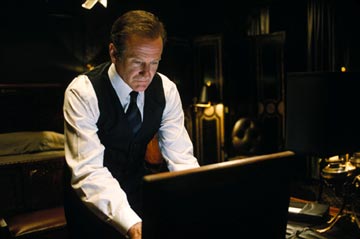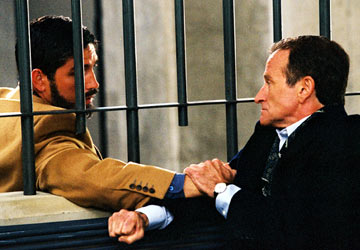

The Final Cut is the second film to receive a digital only distribution under AMC theaters, after the equally forgettable Evergreen. It has a very interesting premise, which makes up for its slow pacing, and for a while seems like it will do something original, before succumbing to the typical Hollywood plot twists. The story takes place in the present, but has a very sci-fi bent to it. In this world of The Final Cut, something called the Zoe Implant exists, and has existed for decades. It is a chip that parents could implant in the mind of their newborn children, which would record all waking moments of the person's life. Upon death, a 'cutter' would take all of the footage and make a film about the person's life. This raises a whole slew of ethical issues, privacy which is the least of them. Cutters have their own code of conduct, which includes non-disclosure about the secrets of their 'clients.' In other words, if they see something criminal, they can literally cut it from existence.
The film takes place in what seems to be the present or near future. Alan Hakman (Robin Williams, Insomnia, Death to Smoochy) is one of the most adept cutters. There is a line of people waiting for his services. His latest project involves creating a 'Rememory' for one of the corporate executives of the film that produces the Zoe Implant. This is the first time that somebody this close to the implant had his chip removed off company premises. Fletcher (Jim Caviezel, Bobby Jones: Stroke of Genius, The Passion of the Christ), an ex-cutter, now leads a protest movement against the implants. He wants that specific chip, because he believes it contains incriminating information that would help his cause. The movement is gaining strength, and frequently protests cutters and memorial services where rememories play.
This is another walk on the dark side for Williams. He is much more interesting playing these complex characters than when he acts like an idiot. Hakman (lame pun on the name) is a very isolated person. His work is his life, and he lives vicariously through the lives of the dead people whose implants he edits. He hates to socialize, and has a barely there relationship with Delila (Mira Sorvino, Gods and Generals, Between Strangers). Hakman is introverted almost to an extreme, with very few social graces. This is a man used to spending a lot of time alone, somebody ideally suited to be a cutter. Williams brings a sense of uneasiness to his role. People are never sure what Hakman is truly thinking, and something about this guy seems wrong. The story hints at some dark secret in Hakman's past that helped to make him the person he is, and gradually reveals what it is.
Instead of turning The Final Cut into a movie about what crimes may be on the Zoe Implant, writer/director Oman Naim (Grand Theater: A Tale of Beirut, When Simon Sleeps) turns the tables and keeps the focus solely on Hakman. Hakman discovers something about himself that throws his entire life into a state of chaos. This spills over into his personal and professional life. Since he has little to ground him, his grip on sanity becomes very tenuous. Pressure from Fletcher makes things worse. While a character study of Hakman and the ethical ramification of what he did would be ideal, Naim backtracks and throws in a whole bunch of random chase scenes, effectively ruining the mood of the film. It also contrasts sharply with lots of moody moments where nothing happens, that Naim drags on for a very long time. Does it matter that The Final Cut was filmed digitally? No. It may make it easier for Naim to add some of the cheesy effects of Hakman and coworkers at work, cutting and splicing together pieces of lives. If not for this fact, this would just be another film what most people ignore.